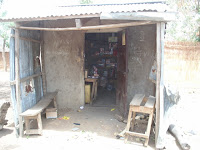
Ngbekendiwe: Try to pronounce that three times fast. The "Ng" is mostly silent. With my level of
hearing loss it is silent. The name means “place where grains are stored”. The
village asked the Todi Diocese for assistance and the Bishop referred the
project to the Health Board WASH Program. This was the WASH Team’s third trip
to the village (my first). The WASH Program emphasizes community participation.
In many past projects the participation was limited to contributing a little
labor and collect sands and gravels for the concrete. The WASH team has learned
that this limited participation did not produce community ownership. Now they
are requiring a minimum of 10% up-front cash. People get serious when Naira is
involved. But they have never been asked by a church or the government to
participate in this way. This is something new to them. The WASH Team tries to
emphasize that they are not here to give a gift to the village but to help the
village to build create a sustainable project that they will own and operate.
 |
| Small Store near the LCCN Church. |
This is not a very poor village, but not a rich village either. It has small stores and other local conveniences. The village structures are
mostly made of mud brick and thatch. There are a scattering of concrete block
buildings with aluminum roofs. It is a clean and well kept village. There are several clay
pits in the village for making mud bricks. This will be mosquito breeding
grounds in the rainy season. The village lies above a tributary to the Benue
River. This whole area was alluvial at one time. The village is a linear
village along a small ridge line.
 |
| Dry borehole. Tank and all pipes have been removed. |
The government has sent “so called driller”
to install boreholes in the village. Mostly, around election time. Of the four
that they told us about only one ever produced any water and the water is
“salty”. Here salty means hard not necessarily tasting like table salt. Many
time the driller can go deeper and get better tasting water. The trouble is
that here they drill will not seal the boring between upper layer of “salty”
and lower layer of water.
 |
| Ngbekendiwe was about 1.5 kilometers long in this 2007 Google Earth Image. |
At today’s meeting the WASH Team met with the Chairman (also the local Imam), the
Secretary and one committee member of the local water committee and the pastor of the local church. The other four
members could not be found. They reported that they have formed subcommittees
in different wards of the village and they have gone to the Local Government
and received the proper papers to be a recognized social agency and can now
open a bank account. They did not know how much money has been committed to do
the project. Yakubu encouraged them to get the subcommittees working and
collect the money needed to meet the 10% minimum. Open an account at the
nearest bank and deposit the money collected. Soon the rains will start and
they will be busy planting their fields.
 |
| Yakubu , Adams, Chairman, Secretary , Committee Member and the Pastor |
In earlier meetings they had been told several options
creating a new water source. They had chosen to have a motorized borehole with
a generator, pump, tank and a distribution system. The cost estimates they were
given were general in nature. Specific, design and detailed cost estimating
have not been done. I currently, have my doubts that this project will happen
this dry season. The road to the village looks like a stream bed in many
places. If they get the funds together by the end of April the new borehole could
be drilled before the main part of the rainy season begins in June.





No comments:
Post a Comment